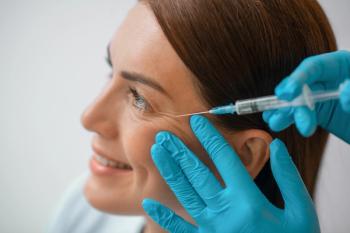
Update on Actinic Keratosis Causes and Care Plans
Brian Berman, MD, PhD, maps the root causes, prevention strategies, and latest treatments for this widespread precancer at 2021 Fall Clinical Dermatology Conference for PAs & NPs.
Affecting more than 58 million Americans, actinic keratosis (AK) is the most common precancer.1 If left untreated, this skin condition may evolve into invasive squamous cell carcinoma (SCC). Brian Berman, MD, PhD, professor emeritus of dermatology and dermatologic surgery at the University of Miami in Florida, provided an update on the pathogenesis, prevention approaches, and new treatment options for AK in a presentation at the 2021
Although a number of studies have demonstrated that AK usually develops as a result of the damaging effects of ultraviolet (UV) radiation to the skin that accumulates over a lifetime of sun exposure, the disease’s pathophysiology is complex. So is its progression from premalignant precancerous lesions to skin cancer.
Berman discussed how the degree of the abnormal expression of specific genes in sun-exposed skin correlated with the progression from AK to SCC, noting the upregulation and downregulation from a normalized gene expression rate.
He pointed out research that showed how increases in the number of AKs impacted the relative risk of developing SCC. While a patient with 1 to 5 AKs may have only a 1.7% chance of the lesions evolving into SCC, that likelihood rises to 11% if there are more than 20 AKs, he said.3
Although age and a weakened immune system can affect the likelihood of developing AKs, people with a history of 5 or more multiple, severe sunburns have double the risk of skin cancer.1
Berman detailed how vitamin B3 is useful in the prevention of AK. There are several variations of vitamin B3 (niacin, nicotinic acid, niacinamide, and nicotinamide), and they are pharmacologically different.
Nicotinamide does not reduce cholesterol or cause flushing, Berman pointed out. Nicotinamide replenishes cellular NAD levels and is a PARP inhibitor. “PARP-1 negatively impacts energy production, DNA repair and genetic stability,” Berman said.
In a study of 386 patients randomized to receive 500 mg twice daily of NAM or placebo, the number of AKs in the NAM group was 13% lower in the nicotinamide group and there was a 30% reduction of new SCCs, both in situ and invasive.4
At 12 months, the rate of new non-melanoma skin cancers (NMSCs) was 23% lower. However, there is no evidence of that benefit continuing after patients discontinued NAMs, Berman said.
Approved earlier this year, tirbanibulin ointment (Klisyri; Almirall) inhibits polymerization and halts the G2/M keratinocyte cell cycle, Berman explained.
In a recent study, researchers demonstrated a mean 87.5% reduction in AK lesions at day 57 after using tirbanibulin 1% ointment on the face and scalp.5
He sees more developments ahead for drugs aimed at preventing AK progression into SCC, both for the general population and solid organ transplant recipients.
Disclosures:
Berman‘s disclosures include: Celumigen, Consultant Stock Options; Dermira, Advisory Board & Consultant Stock Options; Dr. Tattoff, Advisory Board Stock Options; SUN Pharmaceuticals, Inc. Advisory Board & Consultant Honoraria; Exeltis, Consultant & Investigator Honoraria; Ferndale Laboratories, Inc., Consultant Investigator Honoraria; FBM Therapeutics, Consultant Stock Options; Galderma Laboratories, L.P. Advisory Board Honoraria;GlaxoSmithKline, Consultant Honoraria; Klara/Goderma, Inc. Consultant Stock Options; Intraderm, Consultant Stock Options; LEO Pharma, US Speaker, Advisory Board & Investigator Honoraria; MedimetriksPharmaceuticals Inc., Consultant Honoraria; Miragen, Consultant Honoraria Investigator; Encore, Consultant Investigator; Siranomics, Consultant & Investigator; Pierre-Fabre, Consultant; Pfizer, Consultant; Lemonex, Consultant ; Novan, Consultant Honoraria; Novartis Pharmaceuticals Corp., Advisory Board & Speaker Honoraria; Sonoma (Oculus Innovative Sciences, Inc.), Consultant Stock Options; Sensus, Speaker Consultant Honoraria Investigator; PHD Biosciences, Consultant; TopMD, Advisory Board Stock; Ortho Dermatologics/Valeant, International Speaker & Advisory Board; Cutanea, Advisory Board Honoraria; Birch BioMed, Advisory Board Honoraria’ Encore Dermatology, Consultant Honoraria & Investigator; Aclaris, Consultant Honoraria; Aiviva, Consultant; Anacor Pharmaceuticals, Inc., Advisory Board & Investigator; Clark Pharmaceutical, Investigator; Tigercat Pharma, Inc Investigator; Menlo Therapeutics, Consultant honoraria & Investigator; BMS, Consultant; Pulse, Consultant Investigator; Almirall, Consultant; Mediwound, Consultant.
References:
- Skin Cancer Facts & Figures. Skin Cancer Foundation. Accessed November 14, 2021.
https://www.skincancer.org/skin-cancer-information/skin-cancer-facts - Berman, B. Actinic keratosis: pathogenesis, prevention and treatment. 2021
Fall Clinical Dermatology Conference for PAs & NPs , held November 12 to 14, 2021, Orlando, FL, and virtual. - Green A, Battistutta D. Incidence and determinants of skin cancer in a high-risk Australian population. Int J Cancer. 1990 Sep 15;46(3):356-61. doi: 10.1002/ijc.2910460303. PMID: 2394501.
- Snaidr VA, Damian DL, Halliday GM. Nicotinamide for photoprotection and skin cancer chemoprevention: A review of efficacy and safety. Exp Dermatol. 2019 Feb;28 Suppl 1:15-22. doi: 10.1111/exd.13819. PMID: 30698874.
- Blauvelt A, Kempers S, Lain E. Phase 3 tirbanibulin for actinic keratosis group. phase 3 trials of tirbanibulin ointment for actinic keratosis. N Engl J Med. 2021 Feb 11;384(6):512-520. doi: 10.1056/NEJMoa2024040. PMID: 33567191.
Newsletter
Like what you’re reading? Subscribe to Dermatology Times for weekly updates on therapies, innovations, and real-world practice tips.











